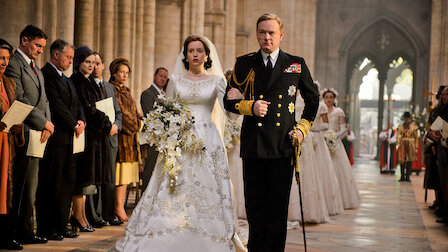The Kardashian's 'Pick Me' Brand of Empowerment on New Hulu Show
On their new show, The Kardashians, the famous family continues to use their personal lives as advertisements for thier billion-dollar businesses.
Americans love the British monarchy. This may seem confusing because only a few short hundred years ago they were our worst enemies, and every year we celebrate our independence from them. But Claire Foy, who plays Queen Elizabeth II in the first two seasons of Netflix’s historical drama, The Crown, noted the American public’s affinity for Prince Harry and the gang in an interview. She said, “Americans love the royal family. Apparently, they’re on the cover of People magazine!”
The Crown humanizes the monarchy, which might explain its popularity. Most compellingly, we get a window into Elizabeth and Prince Phillip’s (Matt Gates) relationship. Early in the season, Phillip feels emasculated that Elizabeth will not take his name in marriage and that their children will also take her name instead, Windsor. Elizabeth won the argument concerning which name the children would take, revealing that it can take a literal monarch to change the patriarchal norms of marriage. “Am I your wife or am I your Queen?” she asks Phillip as they rehearse the coronation, where she requires him to kneel before her.

In a letter to the young Queen Elizabeth, Queen Mary (Eileen Atkins), her grandmother, wrote, “The crown must always win.” A thesis for the show, this statement would enable Elizabeth to overrule Princess Margaret’s (Vanessa Kirby) wishes as well as Phillip’s. Although Elizabeth approved of her younger sister’s proposed marriage to a divorcee, as Queen, she could not allow it due to church rules. In that letter, Queen Mary had written that “The two Elizabeths will frequently conflict with one another.” In this case, Elizabeth’s identity as Margaret’s sister conflicted with her duties as Queen. Duty won when Elizabeth formerly disapproved of their marriage proposal. Afterward, Margaret tearfully tells her lover Peter Townsend (Ben Miles) that she will never forgive Elizabeth for keeping them apart. This moment shows the deep human toll that the duties of the monarchy took on two sisters, thrust into their roles at a young age.

Although the show confronts patriarchal norms and religious intolerance, it misses a major opportunity to be progressive. While it criticizes several aspects of the monarchy, it focuses on the strict and dehumanizing expectations for members of the royal family. Essentially, it is a show that asks for pity for monarchs. However, the duty that the monarchs find so oppressive comes at the expense of the livelihoods of people they have historically oppressed. In episode two, “Hyde Park Corner,” Elizabeth and Phillip, on a trip throughout the British Commonwealth, go on a safari in Kenya. Indigenous people stand ready to accommodate her when she arrives. The show doesn’t question the obvious racism of colonialism. Instead, it uses colonial nostalgia as a backdrop for the drama of royal life.
Maybe this is why Americans love The Crown, and the royal family, so much. America is the epitome of colonialism. If anything, it is still a colony, only independent in the name. It’s an outpost of the West on someone else’s continent. Even though the royals live glamorous lives, Americans identify with them because they too suffer because they have forced others to suffer. Americans bear the weight of their self-imposed duty to colonize another continent, just like Queen Elizabeth bears the weight of running an empire.
Americans know that their very existence, like that of the British royal family, is evidence of colonial misdeeds. Watching a show that humanizes the royals in spite of what they have done ameliorates American colonial guilt. It’s ironic that Americans opposed to rule by birthright, identify so deeply with the royal family. I guess we haven’t come that far in the last few hundred years after all.
Related lists created by the same author
On their new show, The Kardashians, the famous family continues to use their personal lives as advertisements for thier billion-dollar businesses.
Related diversity category
Ever heard of the bad boy type? The type of man who's sexy yet broody, or the type of man who’s dangerous but has a sensitive side? It’s a well-known stereotype that women are attracted to villains. The question is: why are we?
Related Movie / TV / List / Topic
The director's latest is a dreamlike exploration of a consciousness torn between two homelands, and the implications of history and memory suspended in limbo.